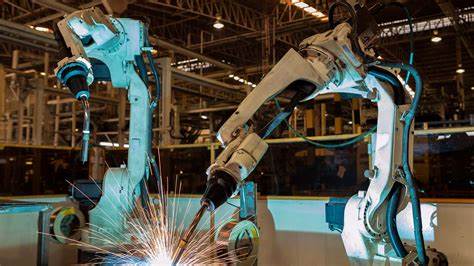Working with robots has been revealed as a major cause of depression and substance abuse among US workers, in a new study out of the University of Pittsburgh.
While it’s common to hear experts and ordinary people talk up the dangers of robots taking people’s jobs in the near future, what we haven’t heard about until now is the effects of working alongside robots.
Despite the fact that workers who work with robots are less likely to suffer injuries on the job, this new study suggests that sharing the workplace with robots may have other, equally unpleasant effects.

Robots in the workplace: depression and substance abuse
“There is a wide interest in understanding labor market effects of robots. And evidence of how robots affected employment and wages of workers, particularly in the manufacturing sector,” says Pitt economist Osea Giuntella, an assistant professor in the Department of Economics, in a media release.
“However, we still know very little about the effects on physical and mental health. On one hand, robots could take some of the most strenuous, physically intensive, and risky tasks reducing workers’ risk. On the other hand, the competition with robots may increase the pressure on workers who may lose their jobs or forced to retrain. Of course, labor market institutions may play an important role, particularly in a transition phase.”
The researchers took data on workplace injuries throughout the U.S. as part of the study. On the positive side, they discovered that for every increase in robot exposure in the labor market, the number of work-related injuries decreased each year. For every standard deviation increase of robot exposure, injuries fell by 1.2 cases for every 100 workers.
However, there was a darker side to their findings. The researchers also found that the more people work alongside robots, the number of drug or alcohol-related deaths increased by 37.8 cases per 100,000 people. Furthermore, communities working next to robots also saw a small increase in the local suicide rate and the number of mental health issues people reported.
Children who eat processed foods have reduced locomotor skills and cardiovascular health, shocking new study
A new study shows that children aged between 3 and 5 who consume more ultra-processed foods have poorer locomotor skills than children who consumed less of these foods. Likewise, children aged between 12 and 15 who consume more ultra-processed foods have lower cardiovascular fitness.
Previous studies have shown that consuming ultra-processed foods is linked with a higher risk for cardiovascular disease in adults, this is one of the first studies to show a link between consumption of these foods and lower levels of physical fitness in children.
These new findings were presented at NUTRITION 2022 LIVE ONLINE, the flagship annual meeting of the American Society for Nutrition held June 14-16.
Click here to read more
The researchers then looked at these effects in the global labor market, through a comparison with Germany. Although both countries saw a decrease in the number of physical injuries taking place on the job, Germany did not experience the same problems regarding mental health.
This, of course, begs the question: why would Americans suffer particularly from sharing their workspaces with robots?
“Robot exposure did not cause disruptive job losses in Germany; Germany has a much higher employment protection legislation,” Giuntella says.
“Our evidence finds that, in both contexts, robots have a positive impact on the physical health of workers by reducing injuries and work- related disabilities. However, our findings suggests that, in contexts where workers were less protected, competition with robots was associated with a rise in mental health problems.”
“There has been an intense debate on the effects of robotics and automation on labor market outcomes, but we still know little about how these structural economic changes are reshaping key life-course choices,” Giuntella adds.

Don’t hesitate to email us at [email protected] for personalized coaching and a client questionnaire if you’d like DEDICATED tailor-made personal training on strength training, building muscle, losing fat, developing athleticism, and more — all to your liking, lifestyle, habits, and taste!
Otherwise, don’t forget to claim your FREE eBook detailing how to lose 20lb of fat while building muscle in 12 weeks! You can claim it here.
Alternatively, you can pick up a FREE eBook on fundamental strength principles offering an introductory workout program.











